If you want to get a job at BCG, you might ask yourself how does the BCG recruitment process work?
Or if you would fit with the Boston Consulting Group culture?
Creative. Team player. Impactful. Passionate.
These are the characteristics of a Boston Consulting Group consultant.
Do these characteristics describe you?
The second largest of the prestigious “MBB” (McKinsey, The BCG, or Bain & Company), Boston Consulting Group is one of the most selective of the Top 3 consulting firms, just behind McKinsey, using a rigorous and challenging hiring process.
In this article, I will remove the mystery of the BCG recruitment process, including the resume and cover letter screening, an aptitude test to screen candidates, the One Way Interview, the behavioral interview, and the case interview.
Let’s get started!
Table of Contents
Get the latest data about salaries in consulting
An Overview Of The BCG Recruitment Process
From the time you apply until the moment you accept the job offer, you will have to progress through a series of steps in the BCG recruitment process.
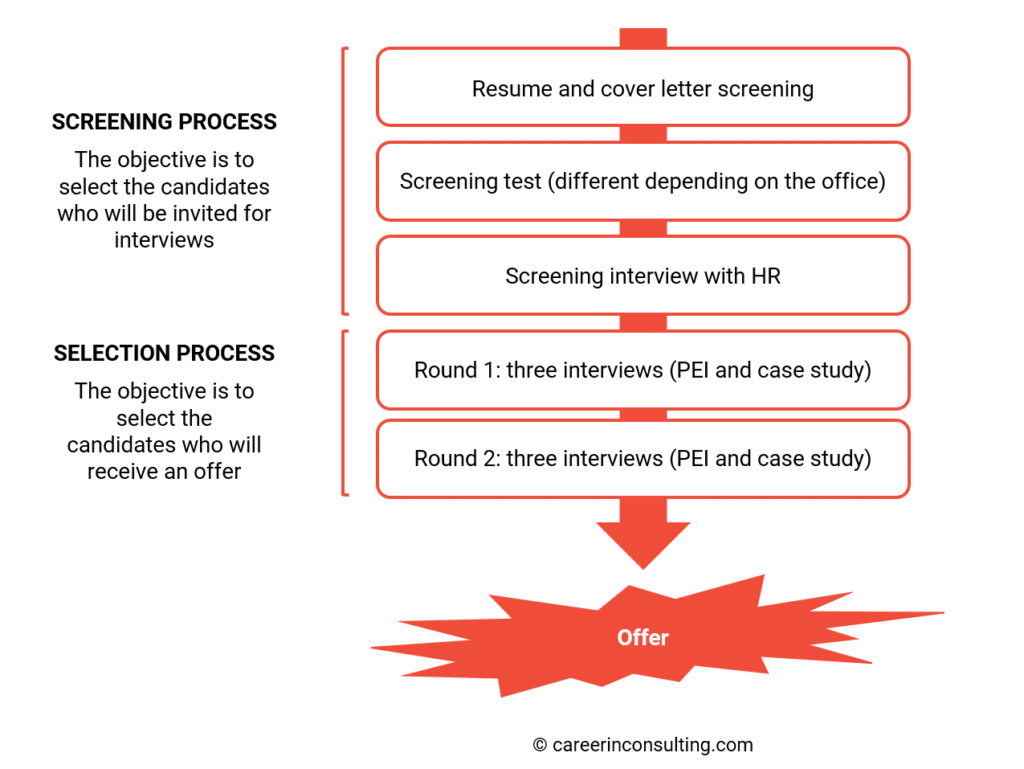
Most of the time, the BCG recruitment process takes between two and three months, often 14 days between steps on average.
However, the two rounds of interviews can be planned for two consecutive days.
Ultimately, the Partners and Principals are involved in compiling and reviewing scores to make an offer decision.
Let’s see which deviations from the standard BCG recruitment process, as shown in the picture above, can happen.
For instance, your interview process may vary if you apply to positions outside of the core consulting practice at BCG Digital Ventures.
In fact, BCG has three major business units outside consulting: BCG Gamma, BCG Platinon, and BCG Digital Ventures. BCG also owns three standalone strategic consultancies: Expand, INVERTO, and BrightHouse.
Each separate strategy group emphasizes different competencies, such as analytics, design thinking, early-stage ventures, and more.
For instance, your interview could include coding tests and project discussions with product engineers, portfolio reviews with other designers, or discussions about coaching and agile methodologies with our agile coaches.
It’s even possible that some interviews outside the core consulting practice do not have case study interviews.
Show Your Uniqueness: The Resume And Cover Letter Screening
Your resume, with a cover letter, is the first step to a very lucrative job at BCG.
Yet, less than 30% of applicants receive a call for an interview.
So, what is BCG looking for when screening your resume and cover letter?
First, BCG Is Looking For Academic Performance
A recent study from poetsandquants.com shows which schools are the top MBA feeders in the consulting industry.
For instance, top MBA programs with good placement in the consulting industry include MIT, London Business School, INSEAD, and Columbia Business School.
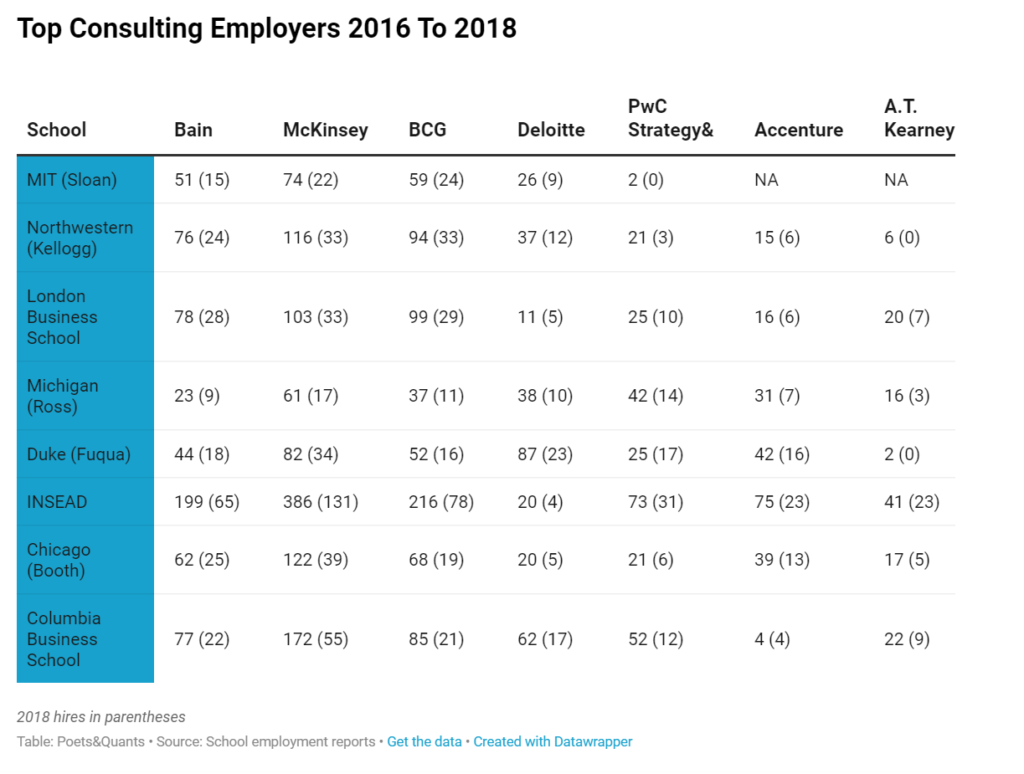
Secondly, BCG Is Looking For Specific Qualities
Boston Consulting Group is looking for people with certain characteristics and skills.
BCG describes ideal candidates as “passionate, open-minded individuals” with “curiosity to ask the right questions, the courage and creativity to blaze new paths, the ability to collaborate with colleagues and clients, and the leadership skills to transform your ideas into action.”
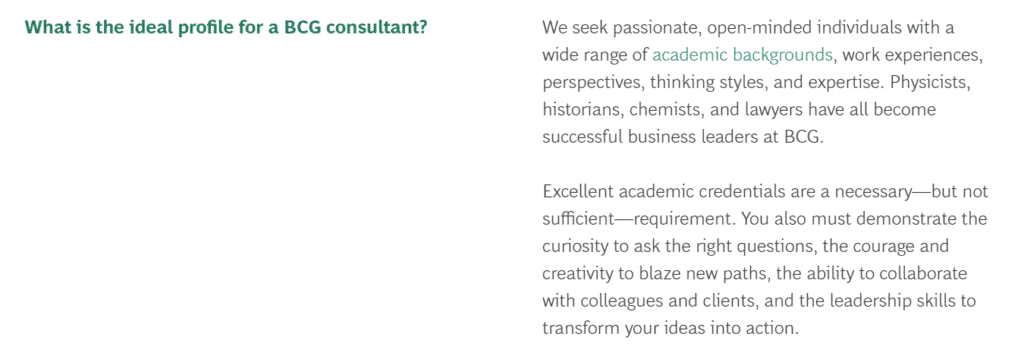
Therefore, all your resume and cover letter content should demonstrate that you have mastered these skills.
To be more precise: your resume and cover letter content must show how you used these skills and the IMPACT you had.
Lastly, BCG Wants To Understand Your Motivation To Join The Firm
BCG wants to understand your motivation to join BCG: Are you genuinely interested in joining BCG over McKinsey or Bain?
Thus, your cover letter must show that you have researched the firm, talked to its consultants, and have persuasive and tailored arguments about why BCG is your first choice.
Are your cover letter and resume ready for applications?
Check these 2x articles to learn how to write winning resumes and cover letters and get lots of examples: consulting resume: 17 advanced writing tips, and how to write a persuasive and customized cover letter.
Get 4 Complete Case Interview Courses For Free

You need 4 skills to be successful in all case interviews: Case Structuring, Case Leadership, Case Analytics, and Communication. Join this free training and learn how to ace ANY case questions.
Don't Stress Out: The HR Screening Interview
In most cases, the HR screening interview is conducted by phone and is aimed at briefly reviewing your background.
For instance, the HR screening interview can include a list of questions such as :
- Background questions include “Tell me about yourself” or “Describe your work history.”
- Motivational questions include “Why are you interested in consulting?” and “Why BCG”?
- Specific skill-based questions include “Tell me about a time when you had to solve a problem in a team”
For this stage, you can expect a 20-minute interview.
Note: This guide will teach you how to answer those questions later.
Alternatively, to a phone screen, you may be asked to complete the One Way Interview (or One Way Video Interview).
The BCG one-way interview is a series of 3 interview questions asked (similar to the questions above) and answered via the video interview website Spark Hire.
Hence, you won’t be speaking with a live interviewer.
Instead, you’ll receive the interview questions when you log onto the site from your laptop.
Spark Hire will record a video of your answers for a BCG recruiter to review at a later time.
To conclude: you won’t have a case interview at this stage.
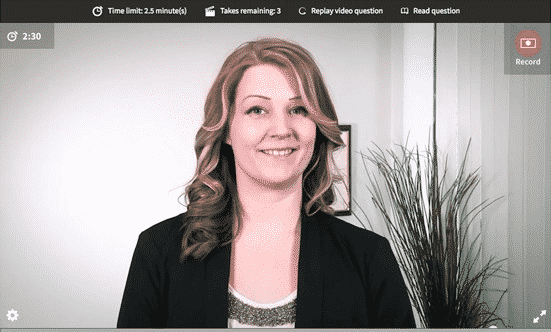
Get 4 Complete Case Interview Courses For Free

You need 4 skills to be successful in all case interviews: Case Structuring, Case Leadership, Case Analytics, and Communication. Join this free training and learn how to ace ANY case questions.
Show Your Logical Reasoning: The BCG Aptitude Tests
All candidates applying to BCG must take an aptitude test.
The type of test depends on the office you are applying to.
However, you can expect one of these 3 tests:
- A GMAT-like test (the BCG Potential Test)
- An online case
- Or a Pymetrics Test
Let’s explore each of these 3 tests.
The BCG Potential Test (or BCG online test)
As an Associate at BCG, you will spend much time reading and analyzing data (from a graphical chart or an Excel spreadsheet).
Besides, you will have to derive insights from these data and connect these insights to your client’s problem.
The BCG Potential Test tests your ability to complete these tasks well.
In other words, the BCG Potential Test assesses your ability to do the job:
Doing well on the BCG Potential Test indicates that you will perform well as an Associate.
Indeed, this test has been designed to assess how you use deductive, inductive, and quantitative reasoning abilities to solve problems logically.
How Does The BCG Potential Test Look Like?
First, the BCG Potential Test is an online test that takes 45 minutes to answer 23 multiple-choice questions, with a similar feel to the GMAT and GRE.
Secondly, the two most common types of questions you can have are:
- Calculate X, Y, and Z given the following data
- Which of the following conclusions are accurate given the following data
Thirdly, no business background is required. You only need your common sense to answer the BCG Potential Test questions.
Lastly, you can’t use a calculator or anything else, just your natural abilities. Math questions are solvable with simple math or approximation.
To conclude, the most challenging part of this test is the time management. You must answer each question is less than 2 minutes. It is very unlikely that you’ll be able to answer all the questions, and BCG doesn’t expect you to do so.
In fact, wrong answers are penalized, while not answering is not.
Examples Of BCG Potential Test Questions
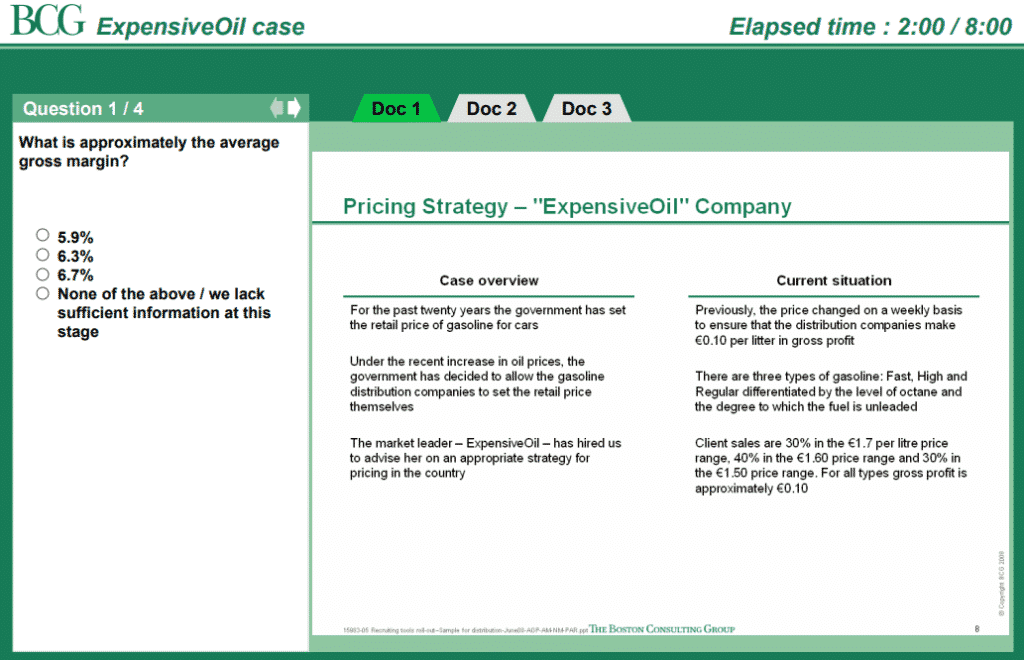
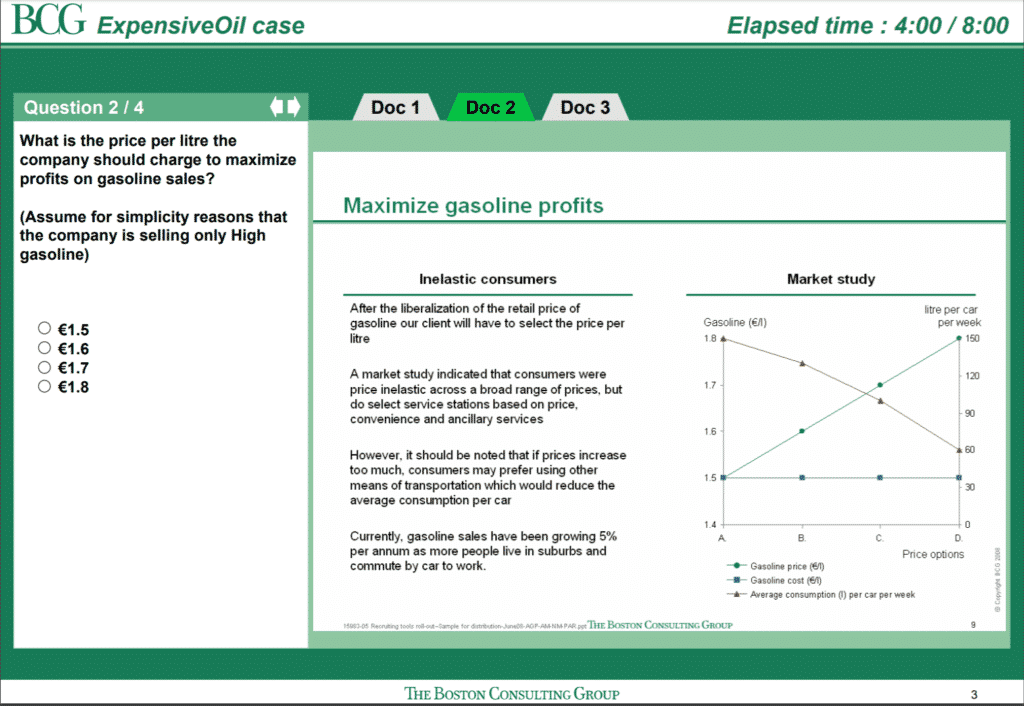
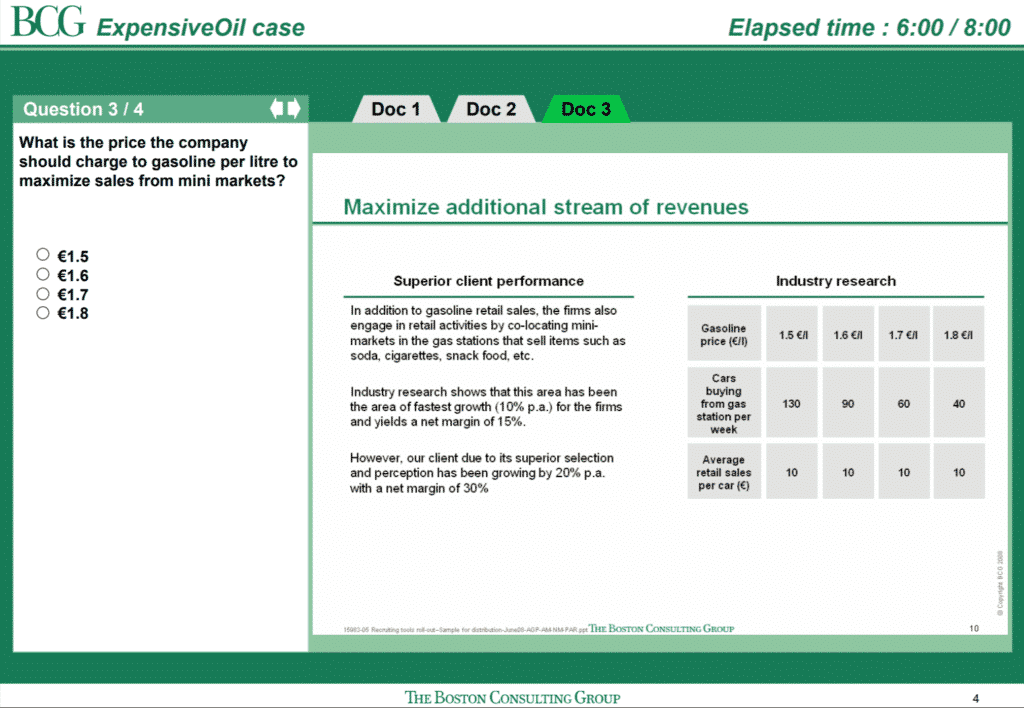
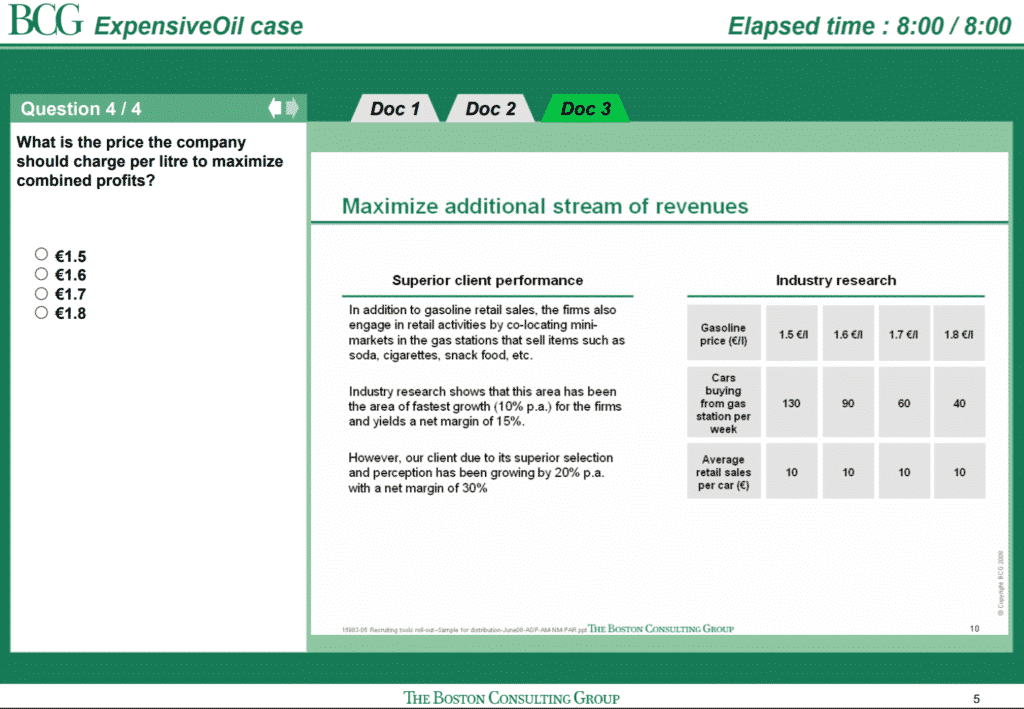
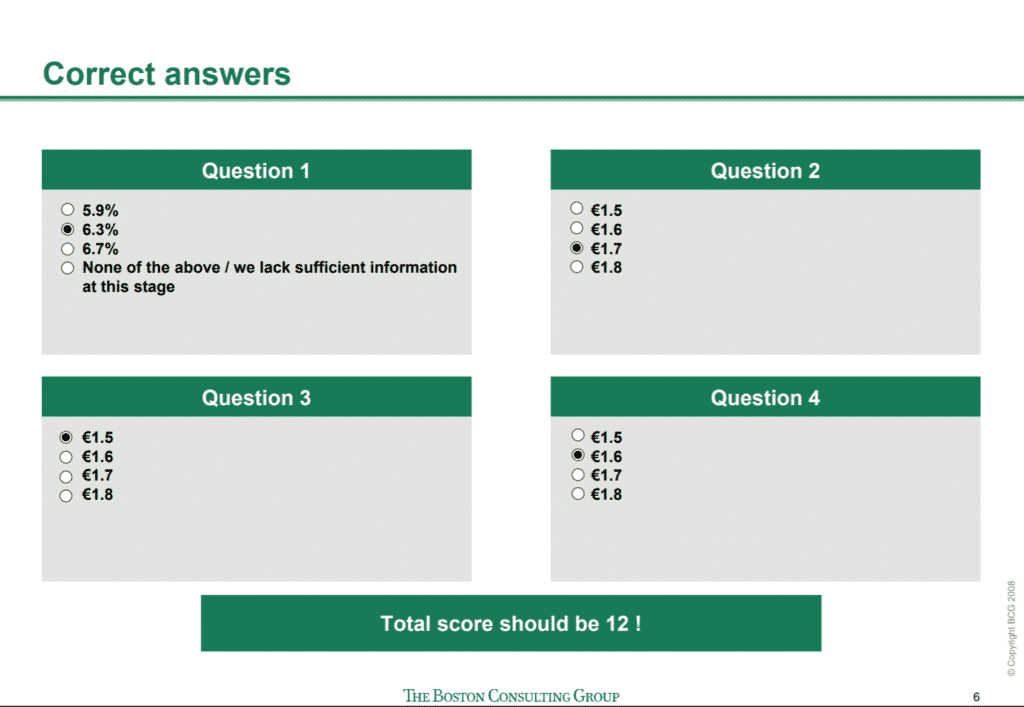
Important: check with your contacts to understand the number of questions you’ll have to answer and the allocated time for the test (it changes quite often!)
Related article: 3 strategies to ace the BCG potential test
The BCG Online Case (chatbot interview)
The BCG online case is a business problem you’re asked to solve on a computer rather than in a one-on-one discussion with an interviewer.
Via the computer, BCG candidates are given an overview of a client, their business problem, and data relevant to the client’s business and the overall market (revenues, costs, business lines, market size, etc.)
They’re asked questions with multiple-choice answers. Many of the questions in the online test are quantitative.
The BCG Pymetrics Test
The BCG Pymetrics test is a series of short mini-games you can take on your smartphone.
The objective?
To assess if you have the personal characteristics of the best-in-class BCG consultants.
There are 12 mini-games, which take 2-3 minutes each.
And these mini-games assess 91 skills and traits.
Overall, the BCG Pymetrics test takes 25 minutes to complete.
Do NOT Neglect It: The Behavioral Interview
After the screening process, there is a selection process consisting of multiple interviews.
This section will tell you everything you need about the behavioral interview.
But, before we start, I want to point out a mistake made by too many candidates: do NOT neglect your preparation for this part of the interview.
Indeed, the behavioral interview counts for 50% of your assessment. In other words, candidates often fail to secure an offer after falling flat on the behavioral interview – even with perfect case-cracking skills.
What To Expect During The Behavioral Interview
During each of your behavioral interviews, you can expect the four following types of questions:
First, “Tell me about yourself” or “Walk me through your resume.”
Then, “Why Consulting?“.
Thirdly, “Why BCG?“.
Finally, behavioral interview questions.
You can expect the behavioral interview to last between 15 – 20 minutes.
Now, let’s go through these 4 questions.
Tell Me About Yourself
You never get a second chance to make a first impression.
This question, or common variants such as “Walk me through your resume,” is an easy and open-ended start to a conversation where your interviewer wants to know the following:
- What are your motivations, and what drives you?
- Which problems you had to solve, and how you solved them?
- What is your academic background?
- How do you deal with people?
- What impact have you had in the past?
Related article: Tell Me About Yourself: How to Answer This Question.
Why Consulting?
A natural question following “Tell me about yourself” is “Why consulting?”.
Because the second most important thing that BCG wants to know after who you are is:
- if you understand what Consulting is,
- and if you are truly interested in pursuing a career in that industry.
Why’s that?
Because BCG doesn’t want you to leave after 6 months when you would have realized that the consulting lifestyle doesn’t fit your objectives.
So, whether Consulting is a thoughtful career choice or an “I don’t know what to do, let’s try” career choice, there are many good reasons why Consulting can be a good opportunity.
Check this article to learn how to craft a compelling answer to the “Why consulting?” question.
7 Reasons Why Consulting Can Be A Good Career Opportunity
- #1 - It's a good career choice after University if you don't know what to do: if you don't know what to do after University or after your MBA (you're not alone!), then Consulting is a safe bet. You'll have the opportunity to explore which career, sector or specialty is right for you
- #2 - You'll have a strong impact: you'll have the opportunity to work on and solve the most pressing problems faced by big corporations
- #3 - You'll have a strong exposure to C-level Executives: early on in your career, you'll work directly for CEOs, CFOs, CMOs, etc. and start developing the soft skills to become a senior Executive later
- #4 - You'll learn a lot: Consulting firms invest a lot in training their consultants. In addition, the feedback culture is very strong and you'll get full performance reviews regularly
- #5 - You'll work with bright people: consultancies pride themselves on hiring bright and interesting people. Plus, with 3-month projects on average, you'll meet a lot of different people in consulting
- #6 - You'll have the opportunity to work in an international environment: large consultancies sell work to businesses and governments all around the world
- #7 - You'll have access to an amazing alumni network: having worked in a consulting firm will give you access to its alumni network that will help you throughout your career
2 Other Reasons Why Consulting Can Be A Good Career Opportunity (But You Can't Tell Them To Your Interviewer)
- #8 - You'll have great exit opportunities: headhunting firms or big corporations love ex-consultants. Even now, 5 years after I left Consulting, head hunters still contact me on Linkedin to point out interesting opportunities
- #9 - You'll earn a lot of money: consulting is also known as a very well-paid industry. The average base salary for a McKinsey Associate is $127,000 a year according to Glassdoor. Plus, your salary will increase between 10% and 25% each year
Besides listing a couple of reasons why you want to pursue a career in consulting, a compelling answer should explain WHY these reasons are important for you.
Why BCG?
Next, “Why BCG?” : This question evaluates your motivation to join BCG.
I have explained in this article how to have a compelling answer to this question.
Behavioral Interview Questions
Finally, your interviewers will ask you several standard behavioral interview questions such as:
- Describe a challenging situation when you have had to work hard to achieve something in a limited time, outside your comfort zone
- Tell me about a time when you have had to work with someone with an opposing opinion
- Describe the greatest challenge you have had to overcome when working effectively together with a group of people
I recommend preparing between 4 and 6 potential stories to ensure every interviewer hears a different story.
Finally, I recommend reading this article to learn how to structure your answers to these behavioral questions.
Get 4 Complete Case Interview Courses For Free

You need 4 skills to be successful in all case interviews: Case Structuring, Case Leadership, Case Analytics, and Communication. Join this free training and learn how to ace ANY case questions.
Be Exceptionally Structured: The Case Interview
The Case Interview Is Another Problem-Solving Test
BCG believes the best way to assess your problem-solving skills is to discuss a real client scenario with you.
This helps them understand how you structure tough, ambiguous business challenges, identify important issues, deal with all the implications of facts and data, formulate conclusions and recommendations, and articulate your thoughts in a fast-moving discussion.
For instance, you can watch this BCG video that outlines what to expect during the case interviews:
Besides what is outlined in the BCG video, you can watch what a real interview looks like in the next video:
Interviewer Led vs. Candidate Led
The BCG-style case interview follows the BCG candidate-led case study interview format.
What does that mean?
First, your interviewer will present a problem. After asking clarifying questions, you must structure an approach to solve this problem.
Secondly, it is up to you to determine the course of the conversation – with some help from the interviewer.
Here are the steps BCG evaluates:
- Problem structuring – organize the problem into an issue tree
- Hypothesis – direct the conversation by choosing a logical path to follow
- Analysis – review a graph and synthesize information relevant to the client
- Quantitative analysis – solve a simple mathematical calculation without a calculator and synthesize the results for the client
- Synthesis – the partner or client CEO is in the elevator with you. What do you recommend they do?
Your interviewer knows the details you learn by asking good questions.
But don’t worry.
The interviewer won’t let you get stuck.
Good examples of interviewer-led cases can be found in the sample cases on the BCG website.
Furthermore, you can read my free case interview in-depth guide.
Other consulting firms, such as McKinsey & Company, might use interviewer-led case study interviews, in which the interviewer asks a series of formal questions about the case.
BCG Wants You To Succeed
Unlike in many industries, management consulting firms tell you exactly how to interview.
The challenge is meeting BCG’s level of excellence.
To help you and other candidates meet baseline expectations, BCG provides these resources to candidates:
- Online interactive practice case studies with a personal score and feedback
- Feedback phone call with one of your interviewers

The interactive case studies scores your abilities in four categories – Structuring, Synthesis, Rigor, Business Judgement – as a percentile ranking against other candidates.
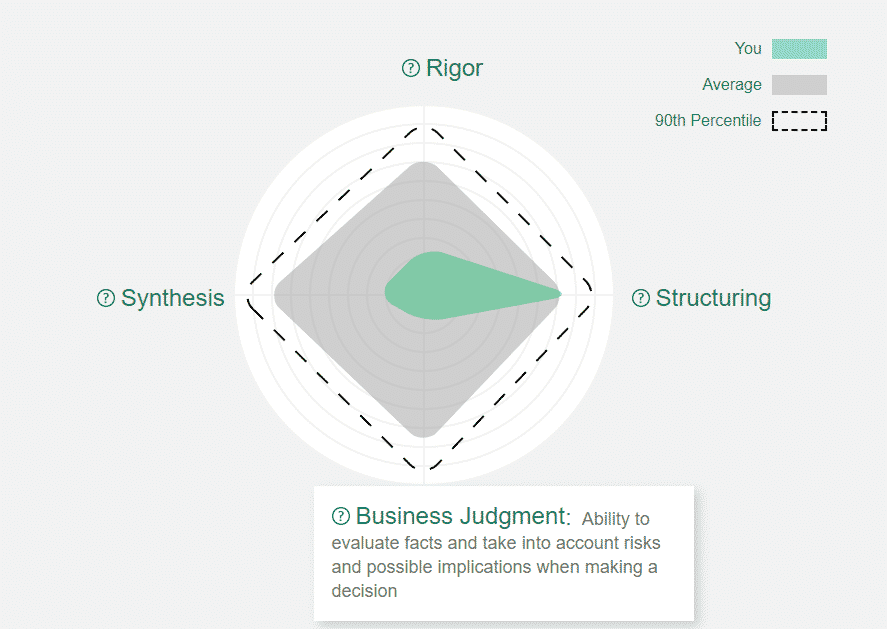
I want you to succeed, too: you can find a list of 250+ practice cases on this page.
Related article: 11 must-know frameworks to ace your case interviews.
You’re Almost Done: Ask the Interviewer Great Questions
You’ve made it through the behavioral and case study portions.
Now, the interviewer asks if you have any questions.
BCG is genuinely interested in your questions.
Interviewers want to know you are passionate about consulting and working at BCG.
Here are some ideas for great questions:
- Make a connection with your interviewer. Ask questions about their background and their current work that interest you
- Explore the culture of the office at which you are interviewing
- Clarify the structure of the office, BCG, or client engagements
You can read this article to build your list of smart questions to ask at the end of your interviews.
The Infamous Blacklist: Does It Exist? And How to Overcome It
The jury is out on if there is a BCG blacklist.
Here’s what I do know: only apply if you are ready to interview.
Remember, management consulting is a destination job for university programs and experienced hires. Competition is strong.
For instance, if you do not pass the interviews, consulting firms will request you wait 12-18 months until you reapply.
Even then, BCG may want to see a significant career change as evidence your skills have improved to pass another set of interviews, such as through a graduate degree, significant promotion, or work at a top-tier company.
Don’t dwell on the question of the blacklist, but remember, competition is tough. Be confident before you interview.
Offered an interview but not feeling ready? I can help you prepare in as little as 4 weeks.
An Interview With An Ex BCG Project Leader
Clément was a project leader at the Boston Consulting Group.
In this video, Clément shares his view on what makes BCG unique, the key skills you must have to land a job in Consulting, and many more tips to go through the hiring process successfully.
Enjoy this video:
The BCG Recruitment Process: Conclusion
To conclude, you now better understand the essentials of the BCG interview process.
Curious about the recruitment process for other top firms? Read more here:
Now I want to hear from you:
Do you have any questions about the process?
With which part of the process do you struggle the most?
Leave a comment below.
Sébastien
Get 4 Complete Case Interview Courses For Free

You need 4 skills to be successful in all case interviews: Case Structuring, Case Leadership, Case Analytics, and Communication. Join this free training and learn how to ace ANY case questions.
SHARE THIS POST

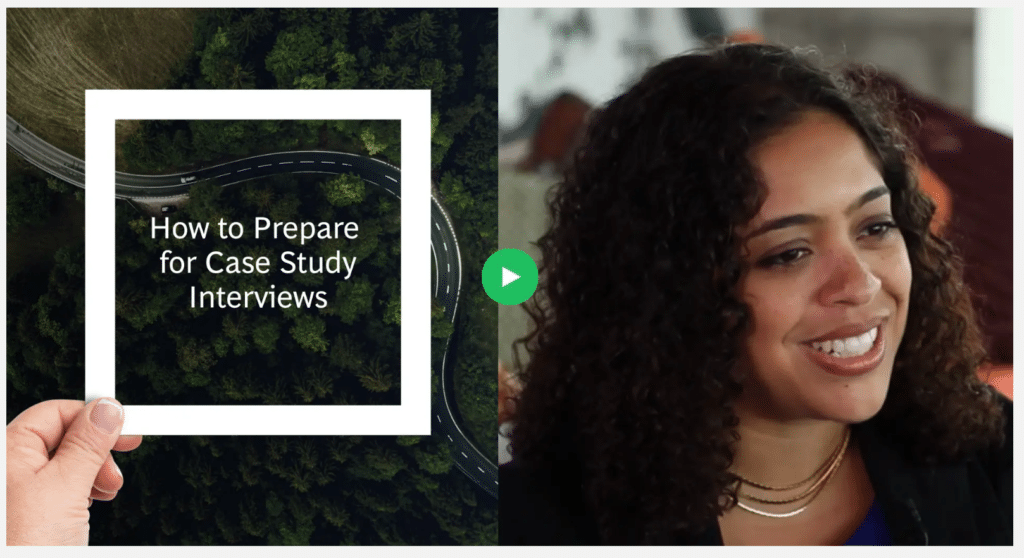
One day I will be part of BCG after my graduation from MBA, I promise and strong believe, wait for me. Anything I can do to show my competence?
Pingback: All About Bain Recruitment Process - Career in Consulting
Hi,
I would like to thank you for your quality contents and resources.
Is the process the same for a industry-related professional who want to join BCG or Mckinsey as a projet leader or principal after some year of experiences?
Do we have to be prepared for some case studies or be more focused on interviews round ?
Regards,
Hi Jennifer. The process is probably the same, with the exception of the quantitative test that is mainly for young graduates. But you need to be prepared for case interviews.
Pingback: How to answer “Why McKinsey?”, “Why BCG?”, or “ Why Bain?” questions - Career in Consulting
Good post. I agree that the BCG recruitment process is long, but it’s also one of the most selective. The average time between steps in the process is 14 days, and you should expect to spend at least 2x months preparing for your interview. But don’t worry – with a little preparation and organization, you’ll be able to ace the BCG recruitment process!
I’m glad you liked this article!
I recently got an offer from McKinsey in Singapore – thanks to case interview resources and online materials purchased on Carousell.
Can you recommend me any books / courses to study to excel after I start? So that I can do better